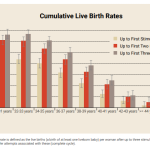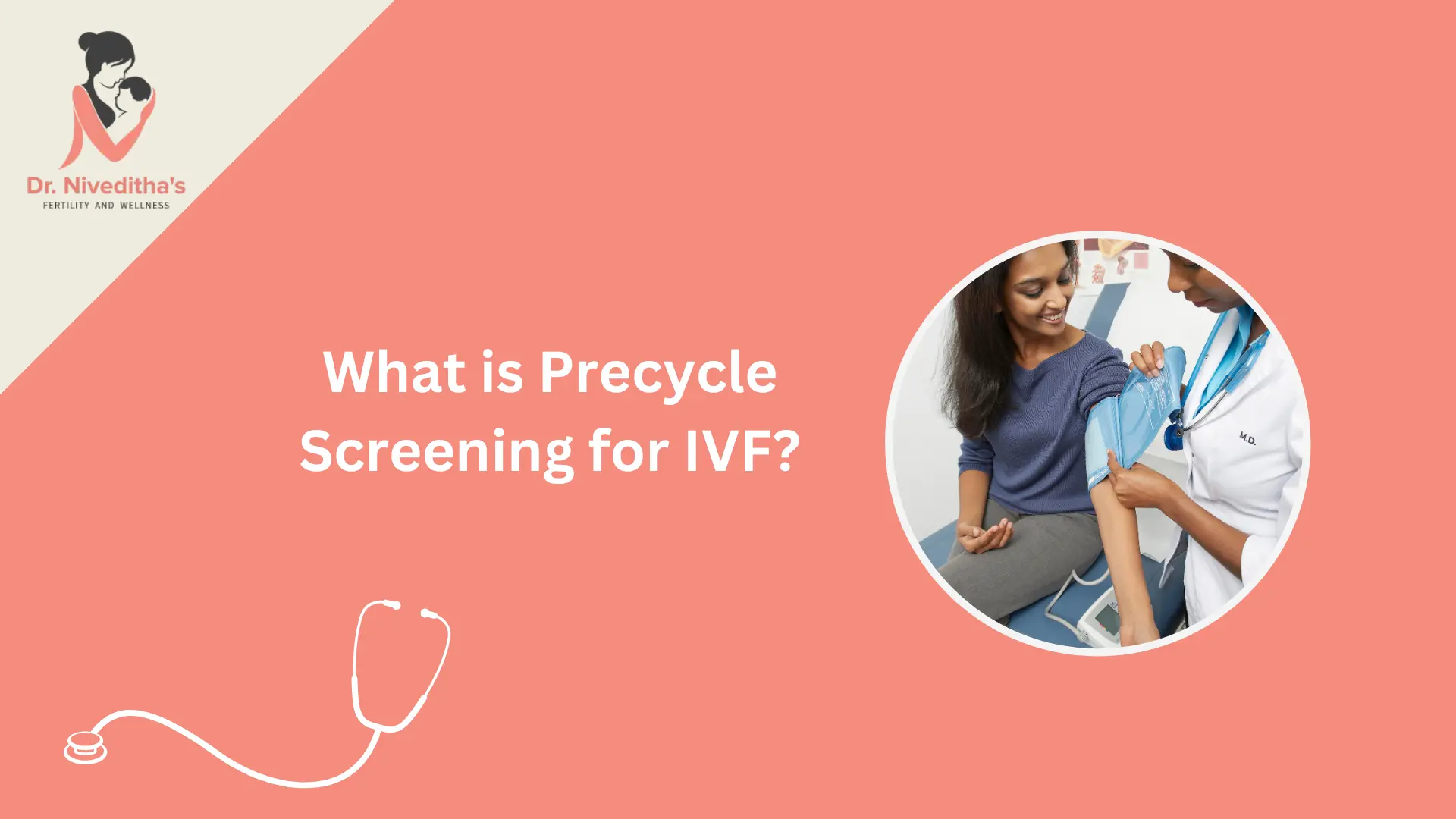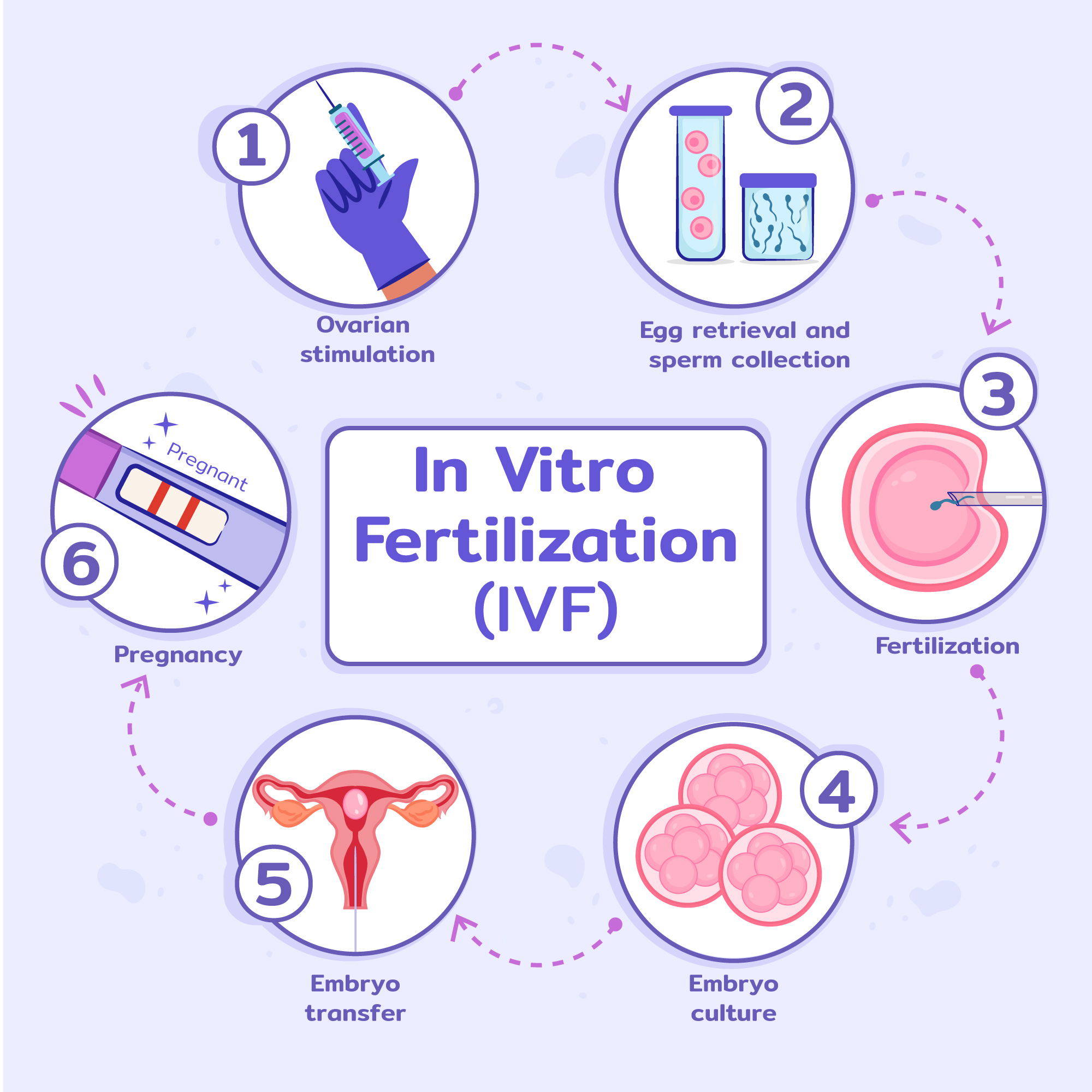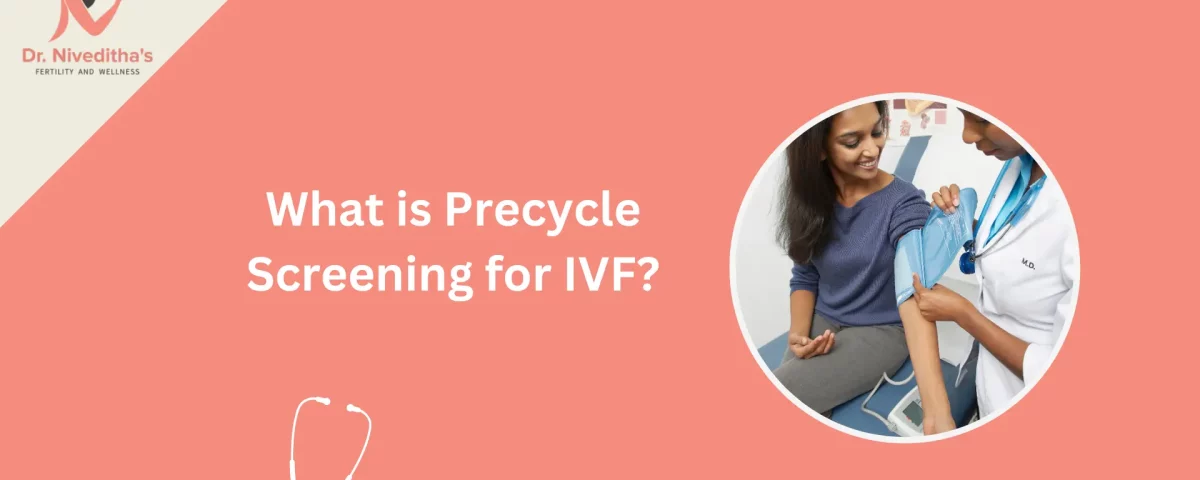
What Is the Live Birth Rate for IVF?
April 26, 2025What Is Precycle Screening for IVF?
Hey there! If you’re reading this, chances are you’re curious about IVF (that’s in vitro fertilization, aka the “test-tube baby” process) and what happens before the magic starts. Maybe you’re thinking about starting a family this way, or maybe you’re just here to learn something new—either way, I’ve got you covered! Today, we’re diving deep into precycle screening for IVF. It’s a big deal, but don’t worry—I’ll break it down into bite-sized pieces that anyone can understand. Think of this as your backstage pass to one of the most important steps in the IVF journey.
Precycle screening might sound like a fancy term, but it’s really just the prep work before the main event. It’s like getting your car checked before a cross-country road trip—you want to make sure everything’s running smoothly. In this article, we’ll explore what it is, why it matters, the tests involved, and even some surprising details that don’t always make it into the spotlight. Plus, I’ll throw in some practical tips, the latest research, and a few real-life vibes to keep it fun and relatable. Ready? Let’s roll!
What Exactly Is Precycle Screening for IVF?
Precycle screening is the first big step in the IVF process. It’s a series of tests and evaluations that doctors do before you start the actual IVF cycle—hence the “pre” part. The goal? To figure out what’s going on with your body (and your partner’s, if you’ve got one) so the fertility team can create a plan that’s just right for you. It’s like a detective mission to uncover any clues that might affect your chances of having a baby through IVF.
Here’s the cool thing: this isn’t a one-size-fits-all deal. Every person’s body is different, and precycle screening helps doctors personalize the treatment. It checks your fertility health, spots any roadblocks, and makes sure you’re ready—physically and mentally—for the journey ahead. Without it, starting IVF would be like trying to bake a cake without knowing if you’ve got eggs in the fridge. Spoiler alert: You need those eggs!
Why It’s a Big Deal
- Boosts Success Rates: By finding and fixing issues early, doctors can tweak the IVF plan to give you the best shot at success.
- Saves Time and Money: IVF isn’t cheap (think $12,000-$25,000 per cycle!), so catching problems upfront can prevent wasted cycles.
- Keeps You Safe: Some tests make sure your body can handle the hormones and pregnancy without surprises.
Fun fact: Did you know some clinics call this the “workup” or “baseline testing”? Whatever the name, it’s your ticket to starting IVF with confidence.
Why Do You Need Precycle Screening Before IVF?
Okay, so why can’t you just jump straight into IVF? Well, imagine you’re planting a garden. You wouldn’t toss seeds into rocky soil without checking it first, right? Precycle screening is like prepping the soil—it makes sure everything’s in place for growth. Here’s why it’s non-negotiable:
It’s All About the Details
Your doctor needs a full picture of your health. Are your hormones balanced? Are your ovaries ready to roll? Is there anything sneaky—like a hidden infection—lurking in the background? Precycle screening digs into all of this. It’s not just about getting pregnant; it’s about staying pregnant and having a healthy baby.
Real-Life Example
Take Sarah, a 32-year-old teacher I heard about from a friend’s fertility group. She was pumped to start IVF, but her precycle screening showed she had a thyroid issue she didn’t even know about. Fixing that first made her IVF cycle way smoother—and she’s got a little boy now to prove it!
The Science Says…
A 2023 study from the Journal of Assisted Reproduction and Genetics found that couples who completed thorough precycle screening had a 15% higher success rate per cycle compared to those who skipped some tests. That’s huge when you’re investing so much hope (and cash) into this.
Practical Tip
✔️ Ask Questions: When your doctor schedules these tests, don’t be shy—ask what each one’s for. It’ll help you feel in control.
What Tests Are Included in Precycle Screening?
Now, let’s get to the juicy part—what’s actually involved? Precycle screening isn’t just one test; it’s a whole lineup. Some are for the person carrying the baby (usually the woman), some are for the partner providing sperm, and a few are for both. Here’s the breakdown:
For the Ladies
1. Ovarian Reserve Testing
- What It Is: Checks how many eggs you’ve got left in your “egg bank.” The key test here is the AMH (Anti-Mullerian Hormone) blood test.
- Why It Matters: More eggs = more chances to make embryos. As we age, that number drops—sorry, biology!
- Fun Fact: Did you know your AMH can hint at how many fertile years you’ve got left? It’s like a sneak peek into your reproductive clock.
- Latest Research: A 2024 study showed that women with low AMH (below 1.0 ng/mL) might need extra stimulation during IVF, but it’s not a dealbreaker—doctors can adjust the plan.
2. Hormone Levels
- What It Is: Blood tests for FSH (Follicle-Stimulating Hormone), LH (Luteinizing Hormone), and estradiol, usually done on day 2 or 3 of your period.
- Why It Matters: These hormones control your egg-making factory. If they’re off, IVF might need a tweak.
- Tip: ❌ Don’t Stress About Timing: Miss day 3? No biggie—your doc can work around it.
3. Baseline Ultrasound
- What It Is: A quick peek inside with a wand (yep, it’s vaginal—not glamorous, but painless).
- Why It Matters: Looks for cysts, fibroids, or anything else that could mess with egg retrieval or implantation.
- Surprise Alert: One woman found out she had a harmless cyst that explained her irregular periods—fixed it, and boom, IVF worked!
4. Hysterosalpingogram (HSG)
- What It Is: An X-ray where dye is injected to check your uterus and fallopian tubes.
- Why It Matters: Blocked tubes or a funky uterus shape can throw off implantation.
- Pro Tip: ✔️ Take Pain Meds Before: It can cramp a bit, so pop an ibuprofen 30 minutes prior.
5. Infectious Disease Screening
- What It Is: Tests for HIV, hepatitis B and C, syphilis, and sometimes rubella.
- Why It Matters: Protects you, the baby, and the lab staff handling your samples.
- Did You Know?: Rubella (German measles) can harm a fetus, so if you’re not immune, you’ll get a vaccine first—and wait a month before starting IVF.
For the Guys
1. Semen Analysis
- What It Is: A lab check of sperm count, shape, and movement.
- Why It Matters: IVF needs good swimmers—or at least enough to work with.
- Hidden Gem: Some guys discover lifestyle tweaks (like cutting back on late-night gaming or hot tubs) can boost their sperm game.
2. Infectious Disease Screening
- What It Is: Same as the ladies—HIV, hepatitis, etc.
- Why It Matters: Keeps everyone safe during the process.
For Both
1. Genetic Screening
- What It Is: Blood tests to spot carrier status for conditions like cystic fibrosis or sickle cell disease.
- Why It Matters: Helps decide if you need extra embryo testing later (like PGD—preimplantation genetic diagnosis).
- Cool Insight: A couple I read about found they both carried a rare gene—they opted for donor eggs and still got their dream family.
2. Thyroid Check
- What It Is: A TSH (thyroid-stimulating hormone) test.
- Why It Matters: An underactive thyroid can mess with ovulation and pregnancy.
- Expert Quote: Dr. Jane Frederick, a fertility specialist, says, “A simple thyroid tweak can turn a ‘no’ into a ‘yes’ for IVF success.”

How Long Does Precycle Screening Take?
Timing is everything, right? Precycle screening isn’t a one-day thing—it’s more like a mini-project. Here’s the scoop:
The Timeline
- Start to Finish: Usually 2-4 weeks, depending on your cycle and test results.
- Step 1: Initial Consult: Meet your doctor, get the test list (1-2 hours).
- Step 2: Bloodwork and Ultrasound: Done early in your period (1-2 days).
- Step 3: HSG and Semen Analysis: Scheduled separately (1-2 hours each).
- Step 4: Results Review: Back to the doc to plan next steps (1 hour).
What Slows It Down?
- Waiting for Your Period: Some tests are cycle-specific.
- Lab Delays: Genetic tests can take 1-2 weeks.
- Surprises: If something’s off (like a cyst), you might need a fix before moving on.
Pro Tip
✔️ Plan Ahead: Book your appointments as soon as you decide on IVF—slots fill up fast!
What Happens If Something’s Wrong?
Finding an issue during precycle screening can feel like a punch in the gut. But here’s the silver lining: it’s better to know now than later. So, what happens if the tests flag something?
Common Fixes
- Low Ovarian Reserve: Doctors might up the meds to get more eggs.
- Thyroid Issues: A pill like levothyroxine can balance things out in weeks.
- Blocked Tubes: Sometimes surgery helps, or they’ll just bypass them with IVF.
- Sperm Problems: Options like ICSI (injecting sperm directly into the egg) can save the day.
Real Talk
Not every issue has a quick fix. If your egg count is super low or there’s a serious genetic risk, your doctor might suggest donor eggs, sperm, or even a surrogate. It’s tough to hear, but it’s all about finding your path to parenthood.
Expert Insight
Dr. Aimee Eyvazzadeh, aka the “Egg Whisperer,” notes, “Precycle screening is like a treasure map—it shows us where the gold is and where the traps are.”

Surprising Stuff You Didn’t Know About Precycle Screening
Alright, let’s spill some tea—here are some lesser-known tidbits that make precycle screening more interesting than you’d think:
1. It’s a Mental Prep Too
- Sure, it’s physical tests, but it’s also a vibe check. Are you ready for the emotional rollercoaster of IVF? Some clinics sneak in a counseling session to help you process it all.
2. Your Hobbies Matter
- Love marathon running or hot yoga? Your doctor might ask you to chill on those during IVF prep—too much heat or stress can mess with your hormones.
3. The Rubella Twist
- That rubella test? If you need the vaccine, it’s a month-long pause. One couple I heard about used the delay to take a spontaneous road trip—turned a bummer into a bonding moment!
4. Sperm Secrets
- Guys, your late-night Netflix binges might be tanking your sperm count. A 2024 study linked poor sleep to lower motility—wild, right?
5. It’s Not Just About Fertility
- These tests can uncover random health stuff—like a thyroid issue that’s been making you tired for years. Bonus health perks!
How to Prepare for Precycle Screening
Ready to ace this step? Here’s your game plan:
Step-by-Step Guide
- Talk to Your Doc: Ask for a clear list of tests and why they’re needed.
- Track Your Cycle: Know when day 1 of your period hits—timing is key.
- Hydrate: Blood draws and ultrasounds go smoother when you’re not parched.
- Bring Your Partner: If you’ve got one, they’re part of this too—semen analysis day is a team effort!
- Chill Out: Stress won’t change the results, so binge a silly show the night before.
What to Avoid
- ❌ Heavy Workouts: Skip the gym the day before your ultrasound—overdoing it can throw off hormone readings.
- ❌ Caffeine Overload: Too much coffee can spike your blood pressure, messing with some tests.
Packing List
- ID and insurance card
- A comfy outfit (HSG day might leave you crampy)
- A snack (low blood sugar after fasting tests is no joke)
Precycle Screening Myths—Busted!
There’s a lot of chatter out there about precycle screening, and not all of it’s true. Let’s clear the air:
Myth 1: It’s Painful
- Truth: Most tests are quick and mild. The HSG might pinch, but it’s over fast—think 5 minutes tops.
Myth 2: It Guarantees IVF Success
- Truth: It boosts your odds, but IVF’s still a roll of the dice. Screening just sets the stage.
Myth 3: You Only Need It Once
- Truth: If IVF fails and you try again later, some tests might need a redo—your body changes!
The Latest Research on Precycle Screening
Science is always moving, and precycle screening’s no exception. Here’s what’s fresh in 2025:
New Tests on the Block
- Endometrial Receptivity Analysis (ERA): A biopsy to check if your uterus is ready for an embryo. A 2024 trial showed it bumped success rates by 10% for women with past failures.
- AI-Powered Sperm Analysis: Machines are now spotting sperm quality faster and smarter than ever—cutting human error.
Big Data Wins
- Clinics are using AI to analyze precycle results from thousands of patients. It’s helping predict who’ll need extra help, like donor eggs, with crazy accuracy.
Expert Take
Dr. Natalie Crawford, a fertility guru, says, “The future of precycle screening is precision—tailoring every step to your unique biology.”
Your Precycle Screening Cheat Sheet
Here’s a handy table to keep it all straight:
| Test | What It Checks | When It’s Done | Tips |
|---|---|---|---|
| AMH | Egg count | Any time | Relax—it’s just a blood draw |
| Hormone Levels | Ovulation signals | Day 2-3 of period | Time it right! |
| Baseline Ultrasound | Ovaries & uterus | Early cycle | Wear comfy pants |
| HSG | Tubes & uterus shape | After period, before ovulation | Pain meds = your friend |
| Semen Analysis | Sperm health | Any time | No hot tubs 48 hours before |
| Infectious Disease | HIV, hep, etc. | Before starting | Both partners need it |
| Genetic Screening | Carrier status | Any time | Ask about family history |
What’s Next After Precycle Screening?
Once the results are in, it’s game time! Your doctor will sit you down and go over everything. Here’s what might happen:
- Green Light: All clear? You’ll start IVF meds soon—usually within a month.
- Yellow Light: Minor fixes needed? You might delay a cycle to tweak things.
- Red Light: Big hurdles? Time to explore options like donors or surrogacy.
Real-Life Vibes
One couple I heard about got a “yellow light” because of a polyp in her uterus. A quick outpatient procedure later, they were back on track—and now they’ve got twins!
Let’s Get Personal—Your Turn!
Precycle screening isn’t just science—it’s your story. So, let’s make this interactive:
- What’s Your Biggest Worry?: Drop a comment below—scared of needles? Nervous about results? I’ll reply with some reassurance.
- Have a Tip?: Been through it? Share what helped you prep—I’ll feature the best ones in my next post!
- Fun Poll: Which test sounds wildest to you—HSG dye or sperm analysis? Vote in the comments!
